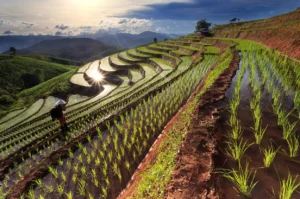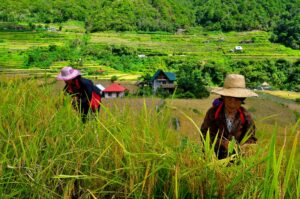The Lee Foundation Rice Scholarship Program offers South and Southeast Asians in the early stages of their careers a unique opportunity to acquire an excellent education from leading academic institutions in areas such as gene discovery and bioinformatics, modern rice breeding, rice systems of the future, and economics and policy.
In 2013, the Singapore-based Lee Foundation and the International Rice Research Institute (IRRI) launched a scholarship program to educate and train a new generation of young rice scientists and researchers to help feed Asia in the future.
Known as the Lee Foundation Rice Scholarship Program, it offers South and Southeast Asians in the early stages of their careers a unique opportunity to acquire an excellent education from leading academic institutions in areas such as gene discovery and bioinformatics, modern rice breeding, rice systems of the future, and economics and policy. The program has already granted six postdoctoral fellowship positions, two MS degree scholarships, and 30 PhD scholarships to students from nine countries in South and Southeast Asia.

Lee scholars are anticipated to become part of the region’s new science leadership and build key partnerships for food security over the next 20–25 years.
At the same time, the scholarship program supports internships and the participation of young scientists in the IRRI-offered course Rice Research to Production. This three-week course aims to create a new generation of plant scientists who are well networked in the international community and who fully understand the importance of innovative plant science in addressing global problems.
One of the most exciting technological innovations for food security is happening in the C4 Rice Project. This project is working to develop a new “breed” of rice that delivers higher yields while using less land, water, and fertilizer. Unlike other breeding programs, the project’s revolutionary approach involves supercharging the photosynthetic system in rice to make it more efficient in using sunlight.
“The scholarship enables me to take a step further,” said Florence Danila, an assistant scientist in the C4 Rice Project attending the Australian National University. “I get the chance to work and interact with the experts in photosynthesis in one of the best universities in the world. Research-wise, I have the best supervision from very successful scientists whose work marks plant science history.”
Hung Xuan Bui aims to be the first nematologist at Can Tho University in Vietnam. The rice root-knot nematode (Meloidogyne graminicola) is considered one of the limiting factors in rice production in all rice ecosystems. The nematode Ditylenchus ungusrus was a serious problem in four provinces of Vietnam along the Mekong River Delta, where it caused yield losses ranging from 50% to 100%.

“The Lee Foundation Rice Research Scholarship gave me a great opportunity to attend a PhD program in the Department of Crop Sciences at the University of Illinois Urbana-Champaign,” said Mr. Hung. “Through the scholarship, I have opportunities to take advantage of advanced techniques, which are useful and helpful in finding the mechanisms of plant-microorganism-pathogen-insect interactions.”
Nepal’s economic growth depends upon rice production because rice is the primary source of food as well as income for the poor. But, despite the modern technologies generated by agricultural research, farmers yields remain low and the sector is saddled with a depletion of natural resources and shortage of labor.
“The career that I’m going to pursue after my PhD will be under the supervision and guidance of a great scientist,” said Sabina Devkota, a scholar from Nepal attending the University of the Philippines Los Baños. “I am sure that, by the end of the program, my skills will be highly developed, which will help me work more efficiently and effectively. This also helps ensure that the Nepal government can give me more responsibility, helping me advance my career, and be part of the decision-making body for future agricultural planning in Nepal.”








